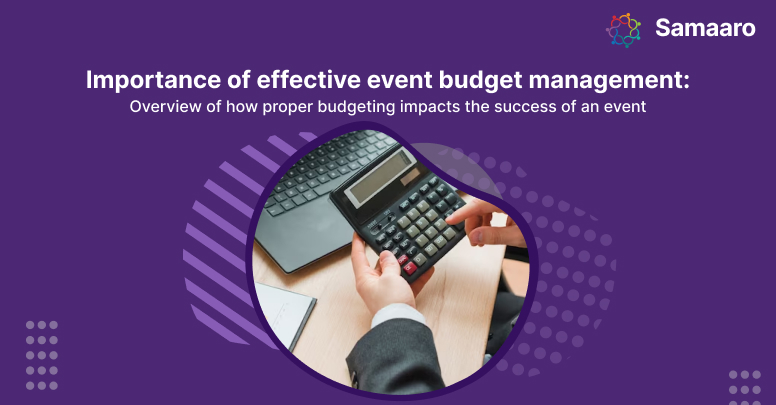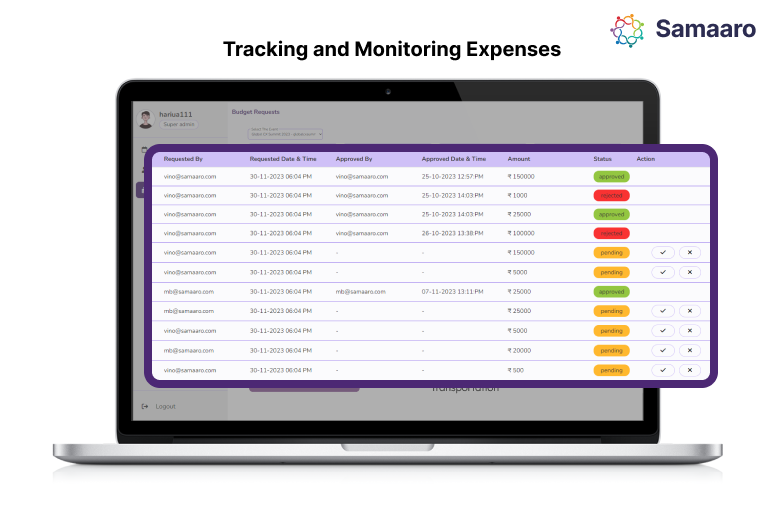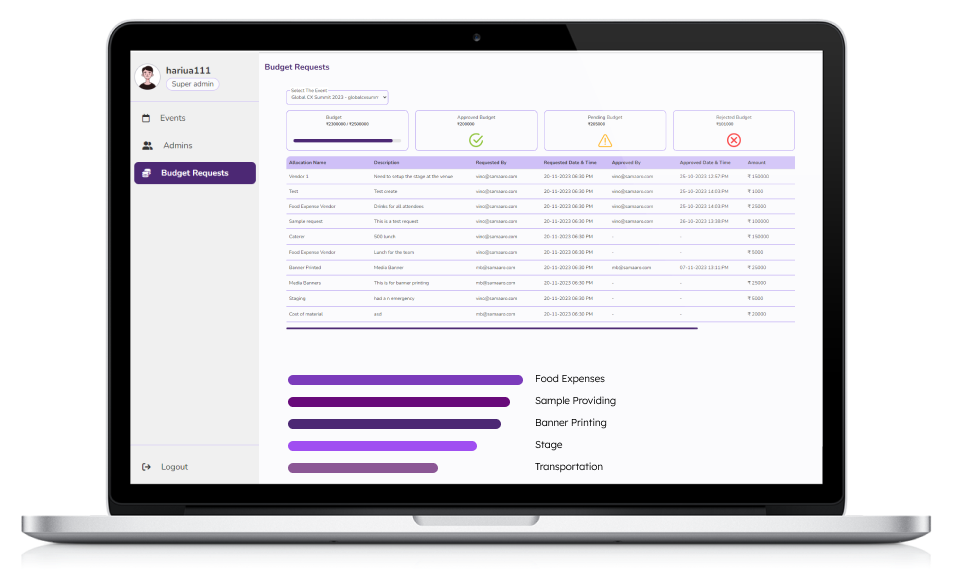Samaaro + Your CRM: Zero Integration Fee for Annual Sign-Ups Until 30 June, 2025
- 00Days
- 00Hrs
- 00Min

While budgeting is the essential element of event planning, it also involves a host of complicated tasks. As in any mock-up for a community fair, corporate summit, charity ball, etc. Budget planning and management is integral to a successful event and seamless delivery.
The Level of Importance Associated with a Well Managed Budget for Events
Regardless of purpose or size, every event involves some level of financial literacy. A well planned and managed budget provides a financial plan to the organizer, so they understand their options with all of the decisions and spending. A budget is not just a financial reconciliation plan; it is a plan of action that allows a group to; make informed decisions, allocate funds, and reduce or mitigate financial risk.
The Consequences of Successful Events
The consequences of positive acts of budget management have implications for every aspect of an event; quality to services provided; quality of attendee’s experience; attractiveness to potential sponsors; ultimately the defining success or failure of the event.
Strong budgets not only allow the event planner to make decisions within financial limits but also allow planning to use resources in a more productive way, receive better deals/income, increase joint partnerships, and allow for great events experiences with a simple and manageable financial envelope.
Event budget fundamentals
The Importance of Developing a Good Budget Plan
A good budget plan is the foundation of managing an event budget properly. Generally, the budget creation process involves breaking down expenses into categories, estimating costs and then providing a contingency.
Breaking Down Categories
This is important to ensure you stay organized. The common event categories include venue, marketing/promotion, catering, staff, rental equipment, permit/license, decoration and miscellaneous. You will want to categorize your budget by size of the category in total and by estimated cost.
Estimate Costs
Do your research and get quotations and estimates from several vendors in each budget category. To gather competitive pricing you may use costs from previous events as a reference, conduct market research to find what vendors list as cost and also reach out to several vendors and follow through with the most competitive price from several vendors. In your budget indicate the specific cost of each item and nothing left out, regardless of if particular items seem trivial, as this often leads to going over budget.
Contingency
You should generally budget for a contingency between 5 -10 % or more, of your total event budget. The contingency will be an emergency fund, and will cover anything that comes up unexpectedly, or issues arise in the planning and execution of the event.
Negotiation Techniques and Cost-Saving
Properly deploying the negotiation techniques and cost-saving initiatives can make a huge impact on the event budget but not impact the quality of the event.
The negotiating variable into negotiating with suppliers
To get the most hopefully improve your negotiating position with suppliers and vendors improve / expand your negotiating skills.Look for the best price, get package deals, check for additional discounts, or simply negotiate for some extras that fit into your budget. Once you develop a good rapport with your suppliers, they can generally find ways to drop their prices or give you more for your money.
Cost-saving ideas
When looking for cost-saving ideas, try and look as broadly as you can, as you do not want to risk losing the credibility of the event. Some examples of cost-saving promotion ideas can be opportunity costs when looking at locations, catering, or advertising through forms of digital media. Remain open minded and begin thinking about new avenues of creativity that can still get achieve your aims for the event.
Sponsorships and Partnerships
Consider sponsorships and partnerships to offset cost. Encourage partnerships with other companies or organizations that may have similar motivations or reasons for planning the event. Consider providing sponsors some valuable visibility or benefit for their monetary or in-kind support for the event.
Monitoring and Tracking Expenses
Monitoring and tracking expenses helps to ensure that the event budget remains on track so that potential changes can occur.
Utilizing budgeting software
Using budgeting software or budgeting tools with the ability to monitor and track expenses for an event. These tools, can do things like, create reports, automate work-flows, and provide real-time feedback on spending trends.Utilize documents that match the dimensions and dimensions of the event, and hopefully are easy to use for the staff implementing the event.
Frequent Review
Once you have set your budget, you should be regularly reviewing and altering based on your spending. By tracking your spending against your forecasted budget, you will see where you are over your budget or where you have the opportunity for some alterations.
You should also be holding team meetings regularly to ensure everybody is clear on the funding objectives, and to discuss any budget amendments.

Planning for Contingencies
Planning for contingencies means that you have made plans for when you incur unplanned costs without hindering the success of the event!
Thinking Ahead on Unforeseen Circumstances
You should be thinking ahead to anticipate challenges or emergencies and build a cushion in your budget for costs incurred because of challenges or emergencies.
Ideally, you would be aware of changes in the field and outside influences that can change the financial framework of the event.
Last Minute Changes
Last minute changes or additions are standard practice, and budgeting for them can decrease your stress for finances.
Maintain a smooth line of communication with your vendors or your team, so when changes, are requested by only one person, you will be able to shift on a moment’s notice.
Back-Up Plans
Create a back-up plan to protect key aspects of your event when you face budget cost overruns or other unforeseen occurrences. Back-up plans may include alternate engagement or venders, or, if possible, shrinking the scale of certain aspects.

Post-Event Evaluation and Analysis
After the event is complete, an evaluation is useful in keeping pertinent information for future budget use and improvement.
Evaluation of Achievements and Limitations
Compare your planned budget versus your actual budget. Identify to what degree the budget was executed well and when the budget did incur unplanned costs and when it could not meet expenditure.
Also, you can assess success of your event in terms of ROI, level of satisfaction of participants and achieving organizational goals.
Utilize the assessment to achieve successful methods to save money and outline where improvements can be made for future events. Document what you learn from the assessment and alter or modify the budgeting process accordingly.
Conclusion
In closing, one of the dynamic and critical components of the event planning process is financial management of an effective event. An event planner can effectively manage not only financial performance but all aspects of an event on their performance and impact through effectively budgeting, employing cost-cutting and negotiation tactics, monitoring expenditure, preparing for contingencies, and assessing post -event. By adhering to these principles event planners can manage tighter budgets while still executing exceptional events.
Bottom line is that the success of managing budgets is not just about the numbers; it is about planning and being flexible to contingencies when creating whatever is memorable and impactful event that they want to achieve within their budget.

Built for modern marketing teams, Samaaro’s AI-powered event-tech platform helps you run events more efficiently, reduce manual work, engage attendees, capture qualified leads and gain real-time visibility into your events’ performance.
Location


© 2026 — Samaaro. All Rights Reserved.